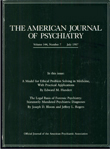Adrenocortical function and depressive illness in mentally retarded patients
Abstract
The authors administered a 1-mg dexamethasone suppression test (DST) to 85 institutionalized adults with mild to profound mental retardation after screening to exclude false-positive nonsuppression. Thirty-one (36%) of these subjects had baseline hypercortisolemia, which was significantly correlated with age, symptoms, and "modified" DSM-III criteria for major depressive disorder. Twenty (24%) of the 85 subjects were nonsuppressors (5 micrograms/dl) after testing; nonsuppression was significantly related to age, female sex, level of retardation, symptoms, and "modified" DSM-III criteria for major depressive disorder (sensitivity 41%, specificity 81%). First-order partial correlations maintained significant relationships between age and severity of retardation but not sex. Mental retardation itself did not appear to invalidate the DST.
Access content
To read the fulltext, please use one of the options below to sign in or purchase access.- Personal login
- Institutional Login
- Sign in via OpenAthens
- Register for access
-
Please login/register if you wish to pair your device and check access availability.
Not a subscriber?
PsychiatryOnline subscription options offer access to the DSM-5 library, books, journals, CME, and patient resources. This all-in-one virtual library provides psychiatrists and mental health professionals with key resources for diagnosis, treatment, research, and professional development.
Need more help? PsychiatryOnline Customer Service may be reached by emailing [email protected] or by calling 800-368-5777 (in the U.S.) or 703-907-7322 (outside the U.S.).



